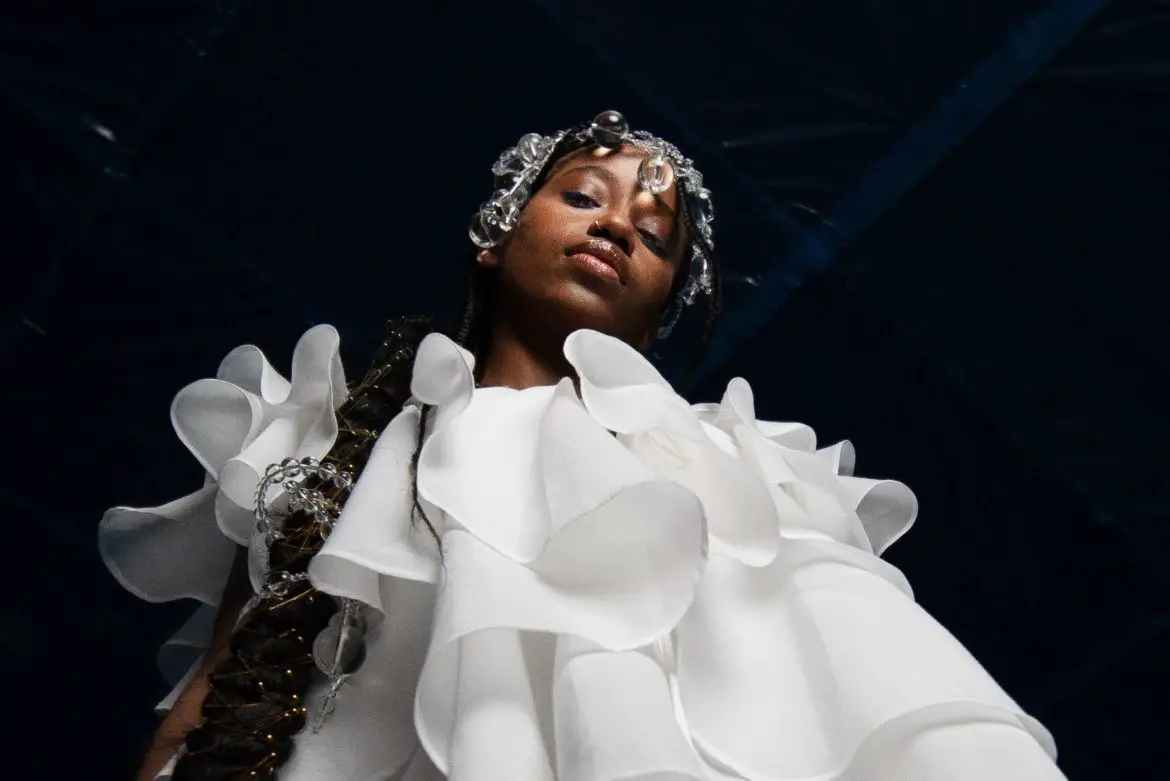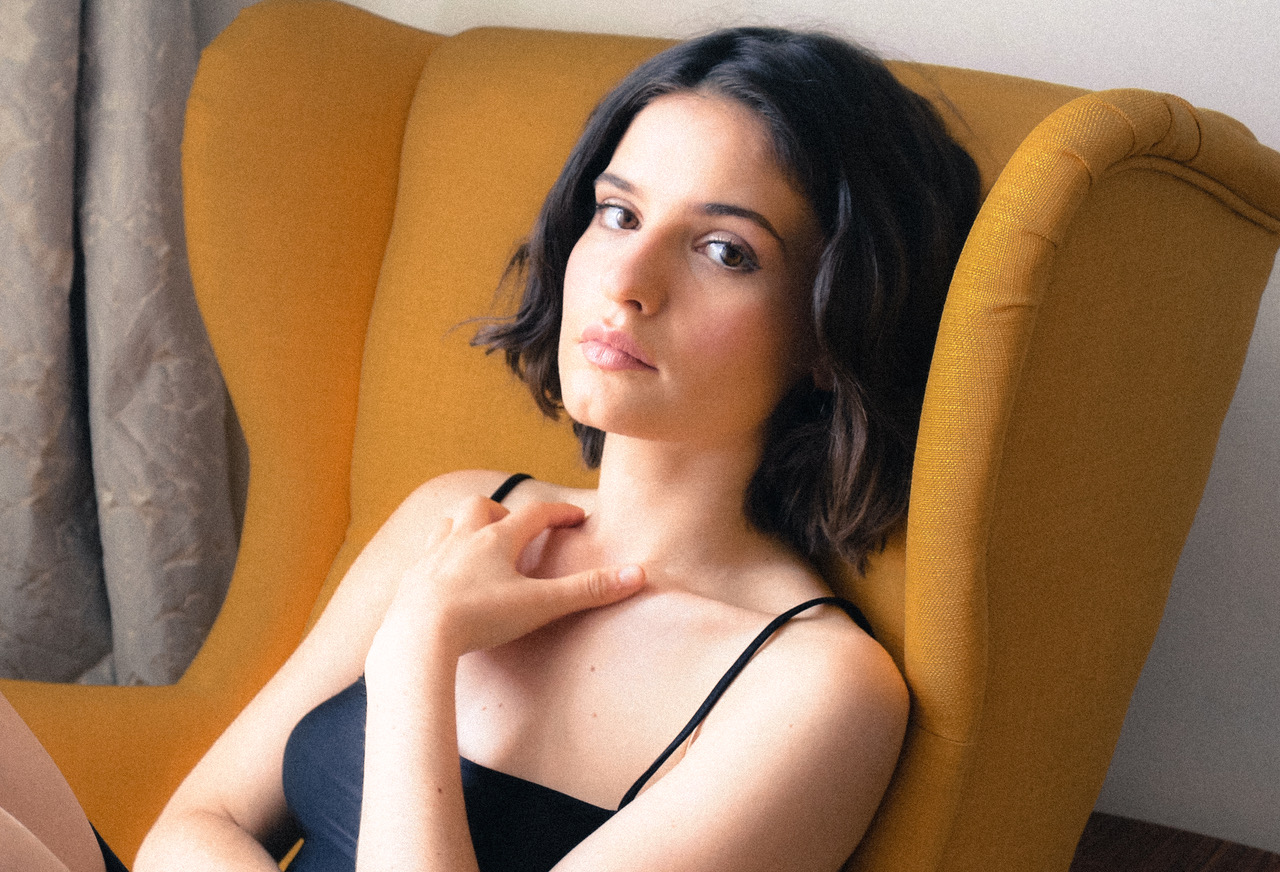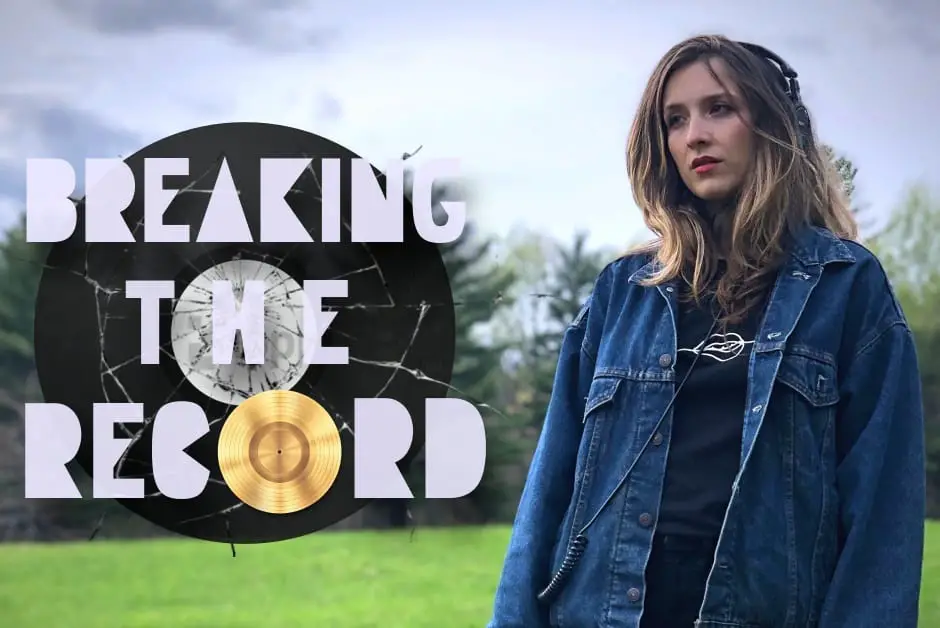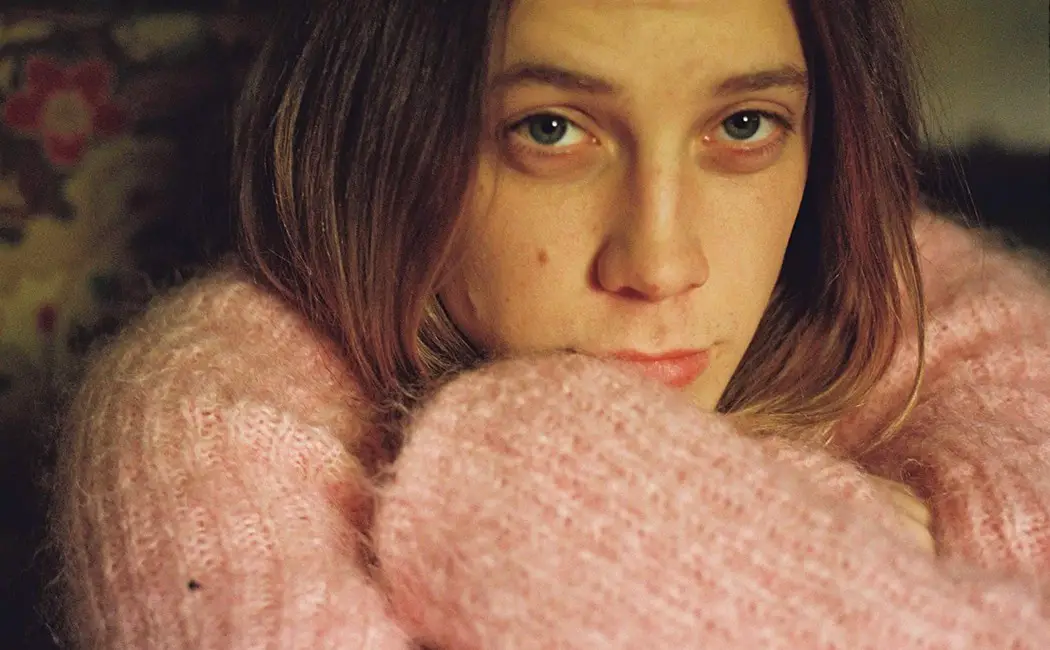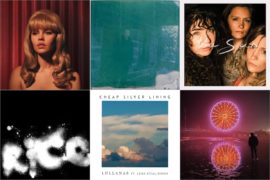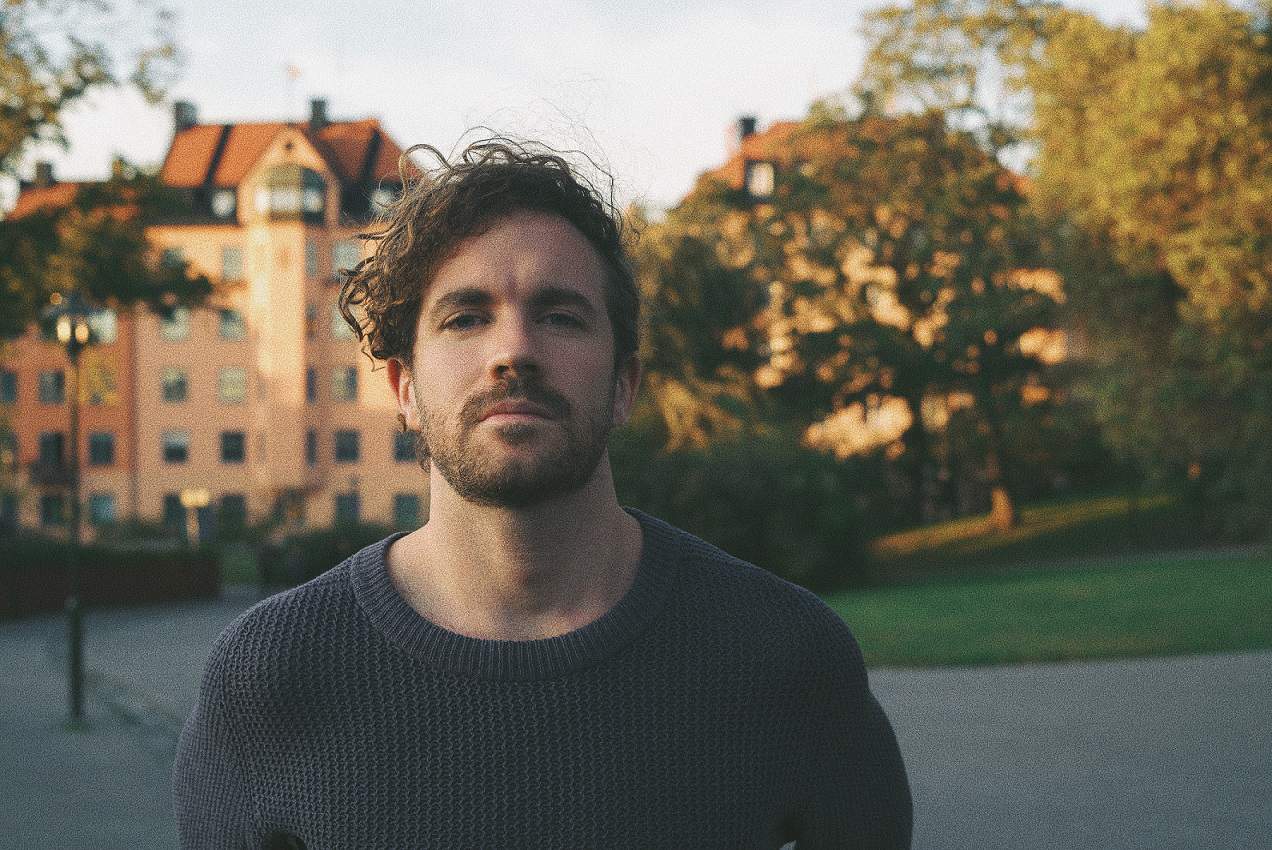Stunning UK artist Denai Moore discusses making three-dimensional music, owning her identity unapologetically, and her third album ‘Modern Dread’ – an explosive and provocative triumph of pop sensibilities, experimental thinking, and inner and outer disruption that inhabits a world unto itself.
Stream: “Cascades” – Denai Moore
I really wanted this listen to feel a bit intense and a bit surprising.
Denai Moore’s inimitable, singular artistry is undeniable.
The British multi-hyphenate has defied convention for much of the past decade, blending genres and styles alongside her astonishing voice – much to the excitement and wonder of listeners the world over. Her stunning third studio album is a creative and commercial climax for the 27-year-old multi-instrumentalist, singer, songwriter, and producer: A triumph of pop sensibilities, experimental thinking, and inner and outer disruption, Modern Dread inhabits a world unto itself. Denai Moore doesn’t just break free of expectation: She establishes a new set of rules that hers, and hers alone.

Fresh out steep, water into dust
Who knew that bruises grew to rust
Finding it harder to adjust
‘Cause I miss the moment when I didn’t know
There were enough
‘Cause I feel too close, too close
To let it go
‘Cause I feel too close, too close
To let you know
There’s parts of me that needs you
Parts of me that feels more alone when I see you
I don’t feel the same kind of rush
But I’m too close, too close
To let it go
– “Too Close,” Denai Moore
Released July 3rd, 2020 via Because Music, Modern Dread is an explosive, propulsive, and provocative record of deep introspection and existential exploration.
The follow-up to 2017’s We Used to Bloom finds Denai Moore co-producing alongside Everything Everything guitarist Alex Robertshaw, and what the pair have created, with the help of a suite of talented artist friends, is simply breathtaking. From the haunting soundscapes and rollicking grooves of opener “Too Close,” to the elegant melodies and soulful serenade of “Cascades,” to dramatic self-embrace of “Slate,” Modern Dread teases light and dark themes together into a tempest that is as unapologetic and outspoken as it is true to itself and true to Moore.
Owning her art unapologetically is an important part of Moore’s identity; her journey has seen its share of roadblocks and obstacles. From sexism to racism and more, she has had to (and continues to) overcome prejudices coming from within the music industry and from her own peers. “I get put in a lot of boxes because of the person I am and what I look like, and it can feel quite frustrating,” she explains. “The music that I make, I try and be as authentic and unapologetic as possible; a lot of other Black artists more in these kind of alternative spaces, sonically, are doing that, and I think it’s really important. I get messages from younger Black girls or kids around the world that are like, “<em”>Thank you for making this music – it validates me in this way.” That’s what’s the most important thing to me, is representing myself best in my platform and using this platform to make music that feels very authentic to me, even when a lot of times the hurdles that I have to get past are my neighbors sometimes seeing my music as, “Not Black-sounding,” whatever that means. As long as I am making the music that I want, I’ll never allow the world or whoever may see me or think what I should make or what I should sound like get in the way of that.”
Just for the hell of it, straight killing it
Don’t need you to believe in it
How’d you get to be so insecure?
No time for staying pressed, we hella blessed
A pleasure to be living it
Own your shit but you should know for sure
It’s not how you lose
It’s how you repave
Forgive yourself but know it’s okay
So clean your slate
I may be far behind, still on my way
‘Cause I’m done picking me apart
I’m gonna let things settle as they are
I’ve got my own back but that’s enough for me
So I won’t measure myself short
– “Slate,” Denai Moore
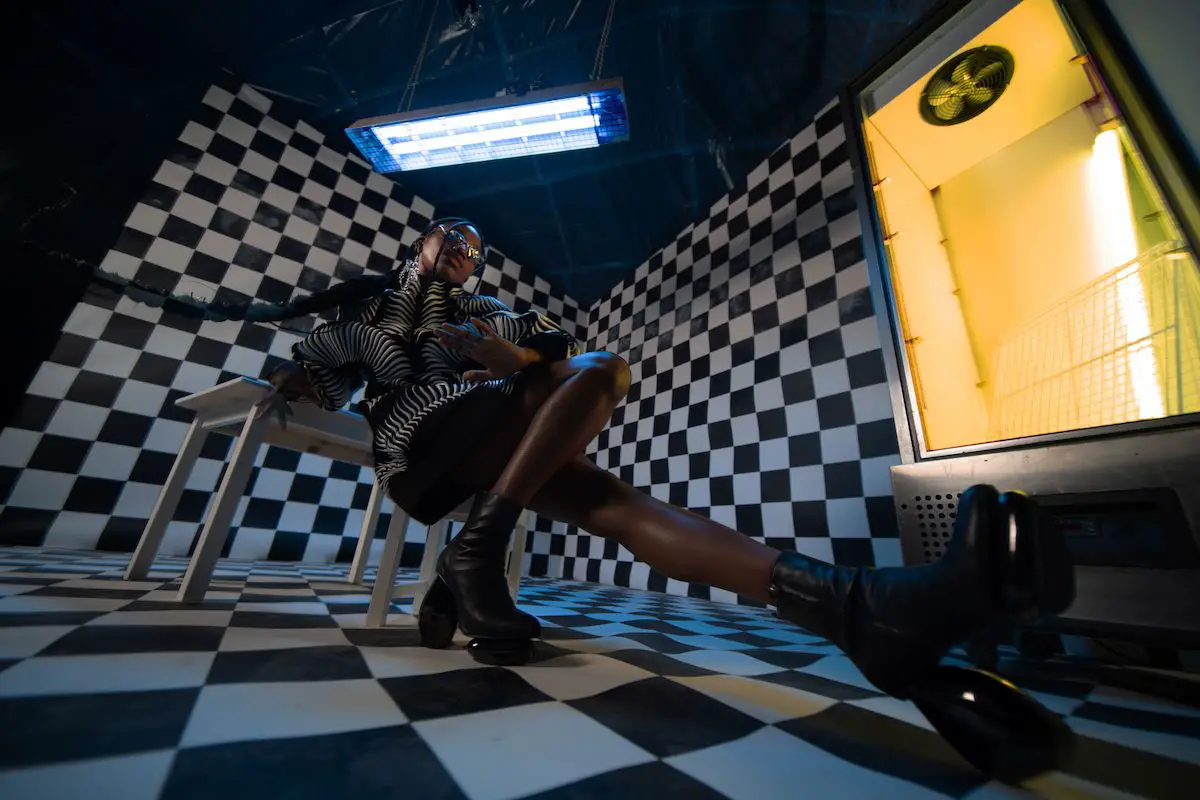
Modern Dread isn’t just a statement to and for the world: It’s also a deeply personal piece of self-expression coming from Moore’s core.
That expression comes to bear in songs of individual grief and personal reckoning, interpersonal relationships, societal discord, and much more. Moore has previously described her music as a “discovery of self,” a concept that unpacks in a number of ways across the record’s thirteen songs. Modern Dread – a term adopted from a robotic voice heard at the end of the album’s cacophonous lead single “To the Brink” – evokes, for Moore, the notion of what it’s like to be alive in a digital age.
“I think there’s this feeling of anxiousness about everything that’s happening in the world, and it’s hard to not be tied to what’s happening politically, when we are so informed, all the time, about everything,” Denai Moore says. “It’s like an endless onslaught. And I think, very consciously, when I sequenced this album, I wanted that feeling… I knew the first songs had to be very hard-hitting and kind of a little bit surprising, sonically, and then there’s a little bit of respite, and then it kind of starts back again. It goes back and forth, and it’s like this almost visceral experience, when you get a little bit of respite, but then it’s a bit of whiplash.”
“That’s something that I was really consciously aware of, when to match the kind of overall kind of feeling of this dread and this anxiousness. You don’t really know what’s gonna happen next; you don’t know what’s coming next. And I think that’s an overriding theme across the record, and just the listen in general; when you listen to the album, you feel that.”
Filled to the brim with evocative sonic stimuli and vivid lyricism, Modern Dread is a memorable, unforgettable listening experience.
Moore seamlessly marries the catchy with the curious, luring her audience in with compelling, colorful instruments and sealing the deal with her soaring vocals and stirring, vulnerable lyrics. Unilaterally, she has unlocked a world of sound and texture for all to explore, enjoy, and indulge.
It’s overwhelming in the best of ways.
Denai Moore recently spoke with Atwood Magazine about making three-dimensional music, the ins and outs of Modern Dread, owning her artistic identity unapologetically, the joys of collaboration, and more. Dive into wondrous, exhilarating depths of Modern Dread in our featured interview, and stay tuned for more to come from Moore’s one-of-a-kind talent.
I think this record sounds and feels like something I’ve always wanted to make… I’ve become more understanding of what it’s like to be an artist. I don’t feel tied down to any world, sonically. I make music that feels authentic to how I’m feeling or what’s happening around me.
— —
:: stream/purchase Modern Dread here ::
Stream: ‘Modern Dread’ – Denai Moore
A CONVERSATION WITH DENAI MOORE

Atwood Magazine: It's great to meet you, Denai! Before we even talk about your music, we're still in the middle of this terrible pandemic. First things first, how are you and your family?
Denai Moore: We are like weirdly good in this scenario. I’m not that far from my family. I moved out of London a year and a half ago. And my mom is a teacher but even though she’s had to work, at times during lockdown, she’s been really close. She’s moved 5 minutes to where she teaches. My family have been relatively safe. I’ve kind of been really lucky enough to live by the sea and just… Yeah, have a kind of slower pace than I’d normally would have, that I kind of just appreciate because even, I’ve just had time to catch up with friends a lot more as well…
It's like life on pause. Where do you live right now?
Denai Moore: In Margate. It’s a seaside town in southeast of England. And it’s the farthest you can go before you’re… As you’re going to France or as you’re looking to Europe, basically.
Okay, so kind of the southeast.
Denai Moore: Yeah, it’s nice. Yeah, it’s just been really nice to have more time to be this connected to nature as well. Normally, I just miss… Yeah, when I’m here, I’m kind of normally recovering from whatever I’ve been working on. So I’ve just been able to go to the beach more, and yeah, do stuff around my house, like I had random house projects that I’ve been able to do, which is nice.
You're living life! And it's the slower, normal pace of somebody who doesn't have a crazy musician job, in a sense.
Denai Moore: Yeah, it’s kind of just like… It’s really nice. And I guess, in a sense, weirdly enough, even if it was this… Okay, I know people are doing sessions now, but even if it was okay to do sessions, it is kind of weirdly distanced anyways. It’s like, how are you gonna do work if you’re working with a producer or a co-writer and you… You sit distanced from each other and you talk from a distance, and the studio is… Tends to be underground in a way. So, I feel like I would probably would have been just doing sessions and writing and preparing for the live show, at the start of March. But I’ve just been able to do that, at home. I’m still writing and working with friends and sending ideas back and forth. And it’s kind of a lot nicer ’cause you have more time as opposed to, you work with someone and they’re here for, I don’t know, a day and then they go somewhere else. And you’ll be quite scheduled. So it feels more human to work with people this way.
I like that a lot. Is Margate where you grew up?
Denai Moore: No, no. I grew up in East London, but I don’t know. At some point over the last couple of years, I just kind of decided to leave the city and… I mean, I get enough of London anyways, ’cause I have to go quite a lot and it’s only an hour and a bit away. So it’s nice, I find, it’s nice that I can choose to come and go. And I can just come here and just almost, kind of weirdly isolate from London.
Right, you have a quiet space.
Denai Moore: Yeah.
I'm glad to hear that everybody's doing well, and congratulations on your album release! What is it like to finally have Modern Dread out in the world?
Denai Moore: Man, it’s really surreal. A lot of work, so much work went into this album. It feels strange that it’s out because I, kind of, obsessed about it for so long. There’s so many details, like mixing, mixing this record was really hard. And sequencing, and kind of, going back and forth, and there was a lot of time in between it as well. Alex from Everything Everything had a kid whilst, literally just, when we started working together and went on tour. So lots of gaps in between, so it does feel a bit surreal that it’s just now here… But it feels good. I’m really happy it’s out.
I want to start off this conversation with your album name, because I find the title “Modern Dread” absolutely fascinating. What inspired it?
Denai Moore: Honestly, I think shortly after making “To the Brink”, ’cause originally I had a very different title for this record, which tends to happen, I feel like I’ve changed my mind quite a lot and things kind of make more sense as I’m writing. I think when I did “To the Brink”, I was just like, “Okay, Modern Dread.” I don’t know, it just came to me. It was just like something ’cause… At the end of “To the Brink”, there’s… It’s really quiet, so maybe most people won’t necessarily notice it, but there’s a robotic voice that says, just like, “Modern Dread,” at the end of it. And I think I just realized that it was a really fitting title for what we’re experiencing now, and for what I think it’s like to be alive in a digital age.
You couldn't have known what the year would actually end up looking like when you were making this record, that we would be in the middle of, probably the darkest time in our living memory and one of the scariest. Was “To the brink” a big part of the launching pad for the rest of the album, in that sense?
Denai Moore: Yeah, it was first song that, me and Alex worked on together, “To the Brink” and “Motherless Child”, and I always felt this immediacy about our partnership, a lot of the times, sometimes sessions just like, they really work and I feel like we really locked in with each other and we were almost… I think even further on as the record went on we’re kind of always thinking the same things, and just really on the same wavelength and I don’t know, it felt like it was meant to be and I met him a few different times previously before, and we just didn’t have time to work with each other, he was on tour quite a lot, and “EE” have released a lot of music back-to-back, a lot of albums. And they were just wrapping up touring for the last one, “A fever dream.” So it was just like, I don’t know, I think sometimes, I didn’t really go into a session, knowing what I’m gonna end up with a lot of the times, or what even comes out and “To The Brink”, just kind of really took me by surprise and it just felt like the start of something new and it really informed the rest of the music and what we did later on with the record…
And yeah, I think it kind of like informed everything else, especially sonically, because I mean it is an experiment, you go in a room with someone and you’re like, “Hey, let’s write something”, like, “I hardly know you but, let’s on a personal level, make music that’s saying something or really emotional” and a lot of the times I kind of… It feels like word therapy with someone that I’ve just literally met, but I think with Alex, we’ve been speaking for quite a while on email, back and forth, and I’d shared him demos and stuff from We Used To Bloom when I was still writing it. So it’s kind of like actually a long… Like a collaboration that was long in the running, like it was meant to happen quite a while back.
That's really interesting. I wonder if these songs that you and Alex made later on in the process ended up being more vulnerable because you knew each other so much better...
Denai Moore: I think so, I think we definitely got into a place where, you’re kind of a little bit more honest, maybe, with the things you want to say and I think especially when we got further down the line, you have to be more honest, you have to be more crucial and to get the record over the line as well and I think we still kind of like… I’m making music now and during these times and talking back and forth, but there are also songs that we just didn’t finish. We didn’t finish or we didn’t get around to… That I used to love. So it’s interesting as well, I think, most of the people, don’t realize that, you let go of so many songs, that are not necessarily, not good, they’re just not right for the moment. And it is like really… It’s just, such an interesting experience ’cause I have to pick these songs to make something, that feels quite cohesive and a lot of it goes from instinct and just from what feels right. Yeah.
That's sort of the difference between playing the albums game and the singles game – I get what you're saying. It's interesting. I know that you are a songwriter, multi-instrumentalist, and producer, and that's flat-out amazing. Would you see yourself working with Alex again in the future to continue this musical experiment, or do you feel like your music has gone to the place now, where you want to expand, work with somebody else, take your own hand at it again?
Denai Moore: That is a tricky one, ’cause I do feel like… At a similar point I’ve written things in this lockdown and before lockdown that felt like, okay, maybe something new is brewing, maybe something will come next – and because of the scenarios that we’re in as well, and just even from the processes with Alex, I think I’ve just naturally been making music on my own and kind of sharing stuff with friends, you know, Alex and Steph, during this time.
I don’t know, there’s like a constant conversation, I feel, and I think I have a lot of people like Alex and Steph especially who I really trust to share things like in very early stages, so I haven’t shared with the both of them at the moment, but just sending random things I’ve written and in different stages, like some more developed than others, ’cause it helps me to share it with someone otherwise I’m just like, you get in a rabbit hole and then, I’m the only one that’s listening to this stuff which, I don’t know, it’s nice to get someone else’s opinion of your…
That's nice. I make music too and every time I send it off to somebody, I suddenly feel like, “Okay, I've completed an idea and I can move on to something else, and I don't have to think about this idea anymore.” Sometimes it actually stifles me from working on something, because I feel like if somebody else heard it, now it's in at least some form of “done” stage.
Denai Moore: Well, I think that’s always been something that, I’ve kind of kept quite close to me, especially in when I think about mixing or the sounds of things, it is like a real collaboration, I think. And it’s nice, ’cause at the moment, I’m sharing snippets of, making of the record and showing kind of behind the scenes world of making it. And it’s a lot of labor of… Not labor, but it’s such an interesting process because all of these songs are so close to me and I’ve written them about very specific things or different emotions, that I feel, that are very surreal. And it’s interesting when it almost becomes like 3D and when I physically put something out into the world. So, yeah, I don’t know, I think it’s really weird, but I think music is, definitely very instinctive, like I think you know when something is happening. I kind of just like… I recognize that I’m definitely at the beginning of writing something else. But I mean, who knows when that will be finished? I don’t know. [chuckle]
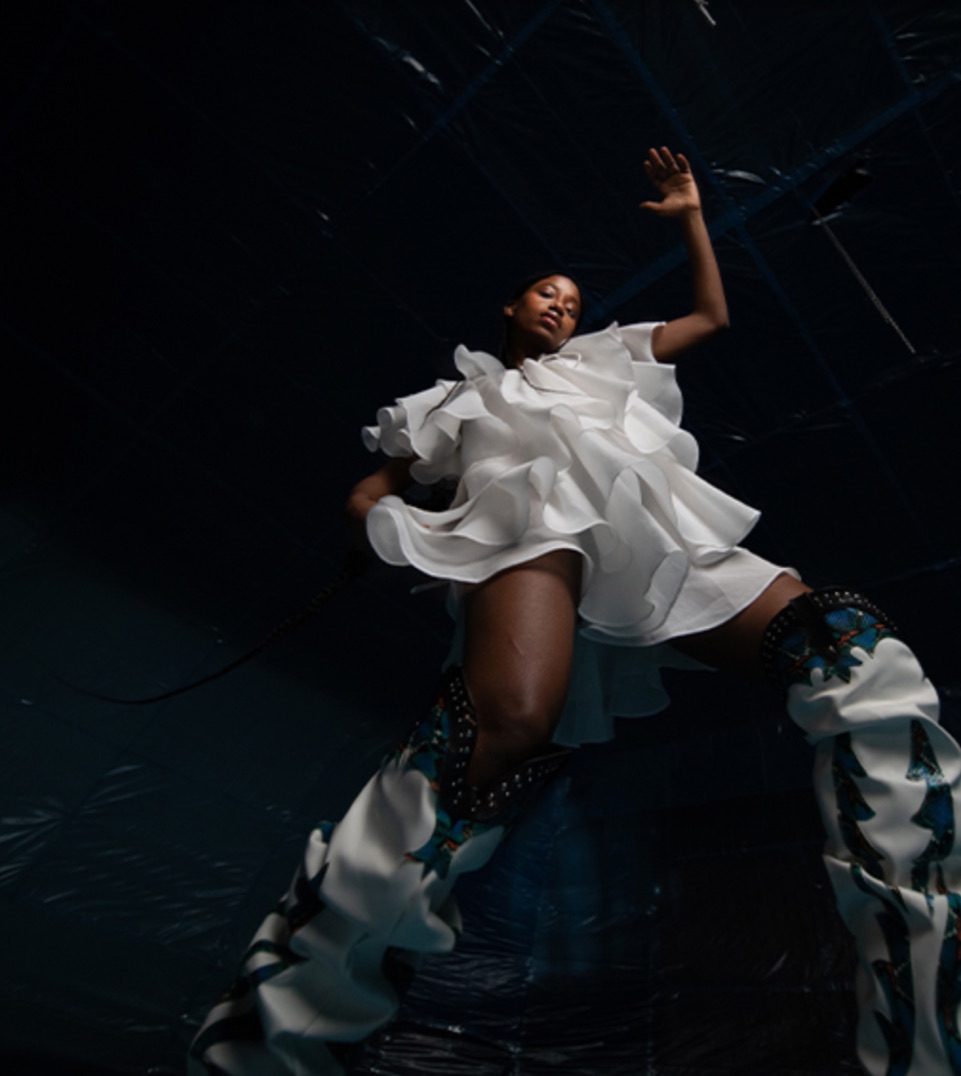
Let's pull it back and talk about the stuff that is out, right? What would you say are the main themes of this record? Is there anything for you that strings all these songs together, that connects them on a deeper level?
Denai Moore: I think just the dread. I think there’s this feeling of anxiousness about everything that’s happening in the world, and it’s hard to not be tied to what’s happening politically, when we are so informed, all the time, about everything. And it’s like an endless onslaught. And I think, very consciously, when I sequenced this album, I wanted that feeling, I wanted it to… I knew the first songs had to be very hard-hitting and kind of a little bit surprising, sonically, and then there’s a little bit of respite, when you hear “grapefruit” and then it kind of starts back again with “cascades.” It goes back and forth.
It’s like this almost visceral experience, when you get a little bit of respite, but then it’s a bit of whiplash. So that’s something that I was really consciously aware of, when to match the kind of overall kind of feeling of this dread and this anxiousness of like… You don’t really know what’s gonna happen next; you don’t know what’s coming next. And I think that’s an overriding theme across the record, and just the listen in general; when you listen to the album, you feel that.
This is your third full length studio album. How does it differ for you in size and scope from your first two records?
Denai Moore: I think I’ve just learned a lot more. Yeah, when I made Elsewhere, I was… I was a teenager, I was really young. And I’ve never made a full project before and I’ve never worked in the studios… Of that stature before. And it was such a massive learning curve. And each time for me, the only important thing is to kind of just be very authentic to where I’m at, in that moment. And I think with each record, I’ve definitely done that and… I love the songs from Elsewhere, I’m still so proud of, “No Light”, I think that’s probably one of my favorite songs I’ve written. And it’s really rare that I look back, because I’m always looking for something else to do, and… Because I’m feeling new things, and I have… I can react… This kind of reactive songwriter instinct to document. Either it’s in like… I just open Ableton and just make something that, just comes out of me, or if I pick up a guitar and sit down and actually write something. So I think it’s kind of like… It’s a tricky one. ‘Cause each process I think, is definitely… I’ve learned a lot more in general about producing, and just what it takes to finish an album.
Especially with this record, I think what really changed aesthetically is that I’ve kind of become a lot more interested in creating a more visual world around the record. Definitely with the cover and all the press shots and everything, how people are informed of me and the kind of version of me in this record, I think is definitely more present.
It's striking, it's very compelling. I mean, pick your poison, whatever word you want to use, there's a statement that you are making – whether it's with the music, with the videos, or with these visuals. You've expanded what it means to be you, your artistry, your music in so many ways.
Denai Moore: Yeah.
One thing I remember from my first time listening to Modern Dread was how colorful and expressive it felt. You had unlocked a world of sound and texture. Can you talk about the instrumentation that you worked on and how these powerful arrangements came to be?
Denai Moore: I think a lot of it actually started… I think with most records, what I love to do is kind of always hinder my environment. So that might vary. I choose to capture the soul of the song first, and then I think a lot of the live instrumentations or… With Michael from Everything Everything’s drummer, and Jeremy, and my trumpet player comes in afterwards, because I think… The harder part is actually to capture that kind of base of the song. And then you get all the live embellishments.
So in this case, it was more me and Alex. The world of the song is… of the record is much of the same sense. And Alex built this amazing modular synth that is really like, the sound of the whole album. Some of the songs started off with me playing organic things, like an organ or Rhodes, like on “Don’t Close the Door.” And kind of more piano, different… Or guitar for “Fake Sorry” and stuff, but then messing with them and taking them to kind of a more textured level as opposed to something being really obvious, like a piano.
I think we definitely… The balance, the high balance was the organic sounds and the more electronic sounds, and getting those wilds components together. Yeah. I don’t know, it’s really nice as well, because on this record, I’ve never really… On previous records, I’ve never really had that many different people play on this record, but it kind of felt natural given that Alex was producing the album, and we worked on the album together, that Everything Everything, the band would play on the album.
So it’s just kind of… It happened in a way that felt really organic. And I’d always had trumpet or some really ramp… On We Used To Bloom, I had strings and a gospel choir, that was really ramp. But before I’ve just like played these things very… On my own, and it used to be very sacred to them. But then I really liked the collaborative effort on this record, especially the instrumentation. Because it’s nice to hear other people’s… Other people play, other people perform on by music, and that’s something that I’m definitely a bit more open to once… Now that I’ve made this album.
Right. It's like you had to get out of your comfort zone, and Alex, on Everything Everything. By the way, it's such a cool feather in your cap, to be able to say that Everything Everything is playing on your album. What?!
Denai Moore: Yeah! [chuckle]
But it's nice to be able to have such a safe experience with somebody who was able to help you go outside your comfort zone. I think about songs like “Honour,” which just hits you in the face.
Denai Moore: “Honour” is very true to the whole organic sounds of the electronic world, because basically we took… I played the original chords for the song. And we basically put it through this MIDI player. I just played, almost like a crazy piano man, I don’t know what you call it. But we played, we put the chords through this self-playing piano and just playing with bits of delay and just different effects, within it to get the kind of rhythm that we eventually got to. But it was just like… It still came from me playing, and then afterwards worked with the kind of more electronic elements to it. It was really fun, some of the see and follow because I really didn’t… [chuckle] I really didn’t know where it’s gonna end up, but it just happened in the most organic way.
That's awesome. I get what you mean. I really think this album is very special. Listening to it, it was an inspiration to find more music that is like it. That is so colorful, that is so big and yet intimate at the same time. It's not using instruments for the sake of using instruments. It's creating this world of different sounds and textures that really melts together, but every track has different sounds and textures. Every track is a different little delight. It's like going into a candy shop, and you see all the different candies, and all the different colors. And all the different flavors. And it's overwhelming in the best of ways.
Denai Moore: Yeah. I think that was my intention. Especially with the sequence, I really wanted this listen to feel a bit intense and a bit surprising.
Charming.
Denai Moore: And light and dark and playing that against each other. I think there’s moments of time in this record that I really enjoy the transition. Especially when… This comes in, it’s really nice surprise, it’s like when… [chuckle] It doesn’t really feel like it should be there in that position, but to me, it made sense to me.
One of the cool things about these songs is also that most of them are not one-dimensional, that you even play with these light and dark contrasts in the music itself. “Too Close” is a good example. It's so stormy and nuanced, and it's... It's a very good album opener. Why did you start the record with that song?
Denai Moore: It just sounded like an album opener. I just remember it, we found that sentence that opens it. And it just felt like it should open the album. Sometimes… It’s really strange, I’m trying to remember why I wanted to open it with first. [chuckle] Wait, let me look. What did I wanna open this… ‘Cause it wasn’t “Too Close,” it was like… I feel like I wanted to open with “Turn Off The Radio” or something really… Or “Slate” or something, but it didn’t really sound… It didn’t sound right. It was just really obvious just to make “Too Close” the start, because it has this opening sentence just sounded right. And I think also the first line to me, “Fresh out steep, water into dust,” feels like you’re stepping into the reckoning maze, it feels appropriate.
I really love the lyrics to that, and I wanted to ask a little more about that. Each of these songs, you mentioned earlier how they're all about different life experiences. But they all come together. The lyric, “'Cause I feel too close to let it go. And there's parts of me that needs you, parts of me that feels more alone when I see you.” I was so stunned by that entry and that intimacy, and I was just wondering if you could talk more about that.
Denai Moore: I think it was like this conversation, with separating yourself and your identity in someone else, and realizing that you are a whole person on your own, and you don’t need other people around you to feel more, I don’t know, okay within yourself. And it’s something that I experienced. And just letting go of something and realizing that it doesn’t define you, and these people that come in and out of your life doesn’t define you. Especially the last outro, when I’m saying, “I’m still me by myself.” It’s something that I was just saying to myself, I’m still me, and not less of myself now, that these people are gone. Even that in itself makes a really good opener, because it’s very self-assured.
Yeah. “Fake Sorry” is also very self-assured. I find that song stunning. It's buoyant, it's sparse, it's evocative. But I really liked the line, and you made me think of this, “'Cause being alone doesn't mean that I'm all by myself.” In that song, it's... I know they're about different things. But at the same time, there's already kind of a through-line between them.
Denai Moore: Yeah. There’s this through-line between “Too Close” and “Fake Sorry” and “Slate”, it’s about understanding that it’s okay to be on your own. And that’s something that I try to check in with myself as much as I can. And understand how I’m feeling about things within myself, and adjust myself to how that is. And a lot of times in the record, you really go in this self-discovery where you’re just constantly analyzing what you’re experiencing, and how you’re feeling. And Fake Sorry was just a song that was very impulsively written, it was written really quickly. I just picked up a guitar one morning and just started writing. But I know that middle layer does feel, to me, really important. Especially the love, the line before I say, “All the love I gave you, I’m giving back to myself.” ‘Cause something that I say quite a lot is, “The love you give yourself lasts forever.”
And it’s something that I’ve really had to learn. I’ve learned that a lot to be kinder to myself, and to trying to be kinder to myself, especially when the world is up in flames. There’s only so much you can do, you have to live with yourself at the end of the day. You have to go to bed with your own thoughts and everything. So sometimes you can give perhaps too much power to so many different things, whether it’s the internet or different things that can maybe affect you mentally. And it’s just, it’s not really worth it. And it’s something that I think is really important to talk about. And in my songs, especially because I do recognize that within myself, that you can be unkind and say the worst things…
I want to go back to that in a second, but because you've mentioned “Slate” twice already, I want to hit upon that song. I can already hear that it's a special one for you. That song is huge. It's almost like a big pop song. Do you look at that as sort of a self-love anthem?
Denai Moore: Yeah. Totally. But it’s also about just straight up owning my okay-ness, it’s really just about understanding that I don’t have to have everything all together, and I don’t have to have it figured out all the time, and just being okay with that. Sometimes I can be a perfectionist, whether it’s in my music, and my own craft… And I really need to just let go of it, especially when I think about music and the way I write, and how fast the songs come out. I used to be so critical of how, “Oh, man. I should have written that quick… I should have… ” You try and compete with this weird, I don’t know, world of how much we should be writing, all this kind of stuff, and… Yeah. The song is just about saying it’s okay to fall off a bit and not be at your best. And I think cut yourself some slack and clean your slate is what the song is. And it’s so direct, it’s something that I’ve definitely opened up to a lot more on this record. You can hear that with “Fake Sorry”‘s words, it has this more… It leans in a more pop direction I think I’ve never really done before, but I have written songs like this and never really, I don’t know, gone for it in the way that I have. But I think it sounds like… “Slate,” to me, still sounds really interesting sonically, and it has all these glassy, very hard hitting synth sounds I think makes it so euphoric, and…
You compare this music to the poetry, that really metaphorical poetry on Elsewhere. And the huge, beautiful harmonies that you scattered throughout We Used To Bloom. Do you feel like you could have made these songs three or five years ago? Was there something that had to happen to let you... To enable you to let go like that and to just go for it?
Denai Moore: No. Because I think when I made Elsewhere, it’s really interesting, one thing I pick up from listening to Elsewhere is that my voice is so muddy and just emotionally a bit more muddy within itself. And I think that’s very true to how I felt at the time. And even… With the title of being Elsewhere and feeling very out of place, it’s a more darker record in that sense, and it’s more authentic. So I think emotionally, I don’t think I would have been able to make this record at any other point because I think… Or, I would have… Yeah. I wouldn’t have written Slate, I don’t think, or… I needed that to also make Bloom and these things happen for a reason. And even now the songs that I write, I think… From working with Alex and really allow myself to just go for it…
I think, will definitely make me feel a lot freer when I make more music, and I think it’s this endless learning cycle where… It’s definitely… It’s hard to say whether I could make it or not but I don’t think I could. I don’t think I could make this record five years ago.
It's really exciting when you can say that you are continuously growing and evolving on each album; how many people can say that? And you truly mean it, and listening to the music itself, each record now it's so different from one another. Right? They are all just like their own little capsule in time, and there are artists here and there who do that, but not many who make such contrasting experiences, and so I appreciate that.
Denai Moore: I think, as well when you make a record, or when you’re writing, sometimes you write things that are almost competing with themselves and I had a few songs… I had a couple of songs that didn’t make the record because it was too… Saying too much of a similar thing to another song that was already in the record and it’s like… You have to pick whichever one you think…
That’s kind of… At the end of the day with the record it’s like, I know it’s done when I know I’ve said everything I wanted to, and a lot of the songs say those things. I think Fake Sorry’s there to say some things specifically and has a different energy to Don’t Close The Door or To The Brink, but they make sense together and sometimes you have to think about that ’cause when you piece together an album… I know other people work very… Maybe might think in a different way, but to me, that’s what I think of… Since I were a kid. And I love the albums I listen to, or love, or musicians… Musicians that I love, their records aren’t quite like, “What’s going on?” It’s quite surprising and…
Can you give some examples?
Denai Moore: Well, even like Age of Adz is a record that I think is very influential on, especially, my last two albums. It’s such an interesting listen, very vulnerable but the instrumentation is almost insane at times and very cluttered, and really playful. Too much to me is some of the sentence parts and stuff I have referenced really heavily on Bloom and on this record as well, and I love the playfulness of that record, but then he also… His last one was so different than Age of Adz and I find that fascinating, but it just makes sense. I don’t know what I’m gonna make next and that’s exciting to me that I don’t know. And I don’t necessarily wanna know. I kind of… When I’m there and I realize that this is something new. That’s what’s exciting about making music to me and you have to allow yourself to go in a place of like letting go of even your perception of yourself, ’cause a lot of times records change you internally, it can… The experience of making something and doing something for the first time and working with someone new, changes something in you. And that’s really exciting. That’s the exciting thing about making music.
I like that lot. So you know, I understand Modern Dread, just correct me if I'm wrong, was the bulk of this written in 2018-2019? Did any of it bleed into the pandemic in 2020?
Denai Moore: No. No. I wrote most of it, probably actually in 2018. The bulk of the songs or… Probably maybe even earlier… Some songs came earlier than that, in 2017. But I wrote really immediately after making We Used To Bloom, straight out the record, I was just writing again and…
And I don’t really know why, it just… Sometimes it just happens that way… Yeah. Mostly 2018. And then some of the songs as we were making them just changed as I was making them, I decided to change some lines. Or I’d just rewrite a verse, which I did a lot on this album, and I rewrote the choruses to The Break with Alex, which was interesting ’cause it was a song in itself and then I, as the song was growing sonically, I changed the chorus. That was something I’d maybe not done before in previous records, where I was just finding myself rewriting.
It's hard to do. It's never easy to go back and change... It's like you change your baby.
Denai Moore: Yeah. But that was the really good… It was a really good challenge. I did… On We Used To Bloom, I would… When we first started making the record, I started pretty much wrote most of it on guitar and then realized that the guitar wasn’t the right thing for the whole record. So in the sesh when me and Steph were making it, I was kind of a little bit stumped and was like, “Okay. I need to write a whole new synth part musically and for Does It Get Easier, for instance, I… That was originally… It was all on guitar, so I wrote those on the spot, or I’d just have Steph leave me in the studio for the day and I’d just rewrite some of the stuff. I did that on this record, like Wishin’ You Better, I completely rewrote the verses. And I wrote more verses, it’s actually really wordy. I just realized these things as we’re making them, that maybe I should change this or maybe I should just add this to it which is like interesting.
It's part of the act of letting go and letting something just be what it wants to be.
Denai Moore: Yeah. Exactly.

Being okay with changing them up. Has Modern Dread taken on new meaning for you in months, in recent months in the wake of COVID-19 and the rejuvenated Black Lives Matter movement?
Denai Moore: It just feels on the zeitgeist. It’s insane, in a way, that I’m releasing it in the midst of everything that’s happening in America now, and the Black Lives Matter movement – so it just feels a little bit surreal, I think it adds to the whole concept of it. “To The Brink” and a lot of visuals have so much imagery of this world that we live in, and in “Modern Dread,” I had the shots about Brexit on TV and stuff like that. As an artist, I do feel somewhat inclined to write about these things because it’s something that we’re experiencing, and it’s hard for me to not write. Emotionally, it’s my way to let go of those feelings within myself.
It’s crazy, ’cause I do think we have been living in this for so long now. We’ve been waiting for so long, and it’s because of this pandemic that we maybe had more time to even uproot so many different things and reevaluate so many different things that we maybe wouldn’t have, had we not been in lockdown. I wrote, on my last record I wrote a song, with the aftermath of what happened to Sandra Bland.
It’s crazy to release this album during everything that’s happening with the Black Lives Matter movement, but it feels quite… I think art is necessary and important to express yourself in that way.
We’ve been waiting for so long, and it’s because of this pandemic that we maybe had more time to even uproot so many different things and reevaluate so many different things that we maybe wouldn’t have, had we not been in lockdown.
You wrote something really powerful on your socials, “Black joy still exists and it will never run out. Black love still exists, and it will never run out. Black faith still exists and it will never run out.” These words really struck me. They're so simple and yet very special. I was wondering if I could ask you and if you're comfortable, about your own personal experience and how your identity translates into your music, into your art.
Denai Moore: For me, a lot of the times I get put in a lot of boxes because of the person I am and what I look like, and it can feel quite frustrating. The music that I make, I try and be as authentic and unapologetic as possible; a lot of other Black artists more in these kind of alternative spaces, sonically, are doing that, and I think it’s really important – especially also, I get messages from younger Black girls or kids around the world that are like, “Thank you for making this music – it validates me in this way.” And that’s what’s the most important thing to me, is representing myself best in my platform and using this platform to make music that I think feels very authentic to me, even when a lot of times the hurdles that I have to get past are my neighbors sometimes seeing my music as, “Not Black-sounding,” whatever that means. As long as I am making the music that I want, I’ll never allow the world or whoever may see me or think what I should make or what I should sound like get in the way of that.
And that’s what’s important, people making art and creating all sorts of things is amazing and important to celebrate and it’s something to talk about and I think it’s really cool to see Moses Sumney and a few of my friends like Petite Noir – an amazing South African artist, him and his wife have created this movement called “Noirwave” – where it’s almost like… Just saying, “We can exist in as many spaces as we want to,” and even making this record, with Everything Everything, it’s not a weird matching. Everything Everything are my favourite UK band, and sometimes… Unfortunately, a lot of people try and keep me in these boxes, musically. It’s just important that I use my platform to make the music that I want to make and then talk about it when it frustrates me, and I might have some really random experiences… but for me, it doesn’t really affect me that much, because I’ve found myself in the music I make and what I put out.
The music that I make, I try and be as authentic and unapologetic as possible; a lot of other Black artists more in these kind of alternative spaces, sonically, are doing that, and I think it’s really important.
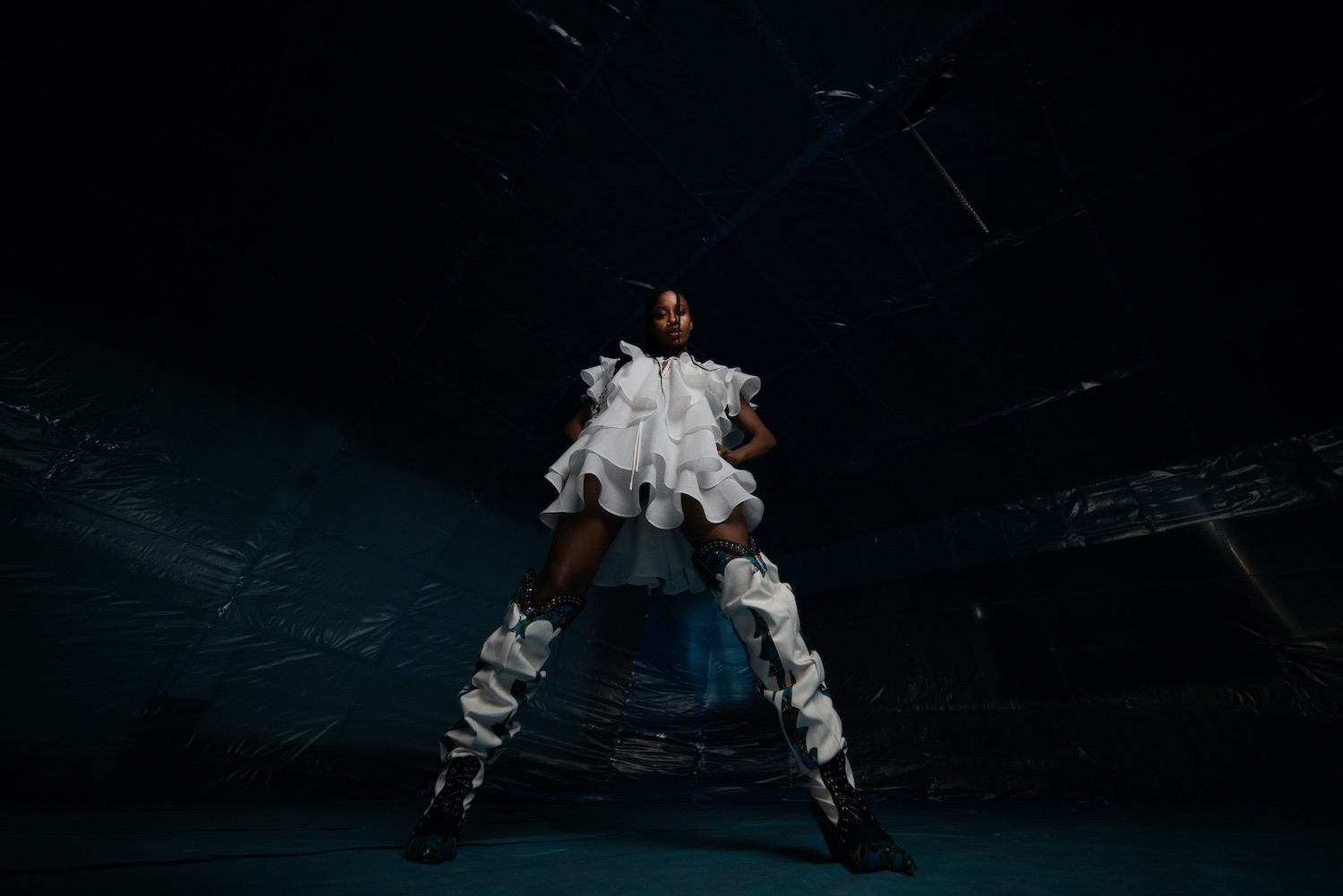
I like that. It's interesting that you mentioned earlier, the statement, “Black enough.” Another artist I spoke to recently expressed the exact same thing, struggling with that identity. And it's really tough when... That experience in particular is really tough, that's something that I had never thought about before as a white person who likes music, who listens to music, it's just a piece of musical identity that hadn't been something that was on my radar.
Denai Moore: Yeah. It’s insane to hear it, ’cause I hear these things pretty much all the time from people I know, that I have to make something and it’s commodified in this way that it’s like, “Wait you don’t want these people to be themselves?” That’s fucked up! People should be able to be themselves in their music. It’s much more pivotal and it’s much more authentic, and… It’s an amazing story when artists are allowed to be themselves. Outside of race, if you think about someone like Billie Eilish, her music transcends these trendy sounds of “what is new” when you allow someone to be themselves… It just doesn’t even make sense. [chuckle]
And we're not saying... We're not saying that her music isn't White enough...
Denai Moore: Exactly. Right? I don’t know, for me, I’m just like… I’ve been very lucky, I’ve had quite a unique experience in this industry where the A&R that signed me when I was younger always validated me and never even said those words to me, but it’s something that, making this record, has come up and it’s like, “What? What do you mean? How does that even make sense?” It doesn’t even make sense. It can feel quite frustrating, but it made me more passionate about this record, it made me want to fight for it more, it made me want to get it over the line more! And it’s times like that when you have to just stick up for yourself and say, “I don’t care what you think, I’m just gonna put it out.”
There's a string of defiance in there too. Like, “Fuck you for assuming anything about me. Listen to the record, let that say its part.” Let the music speak for you. You mentioned something else recently on your social media. You were really pissed off at writers, calling you a vocalist. Can you talk about that too? Because that's another piece of your identity, you were originally a vocalist on someone's track, six or seven years ago, right? That was one of your first gigs, but that's not... You are not only a vocalist.
Denai Moore: Yeah. It’s crazy ’cause it’s weird to write… Around the time I released my first ever EP, I may have worked with Sbtrkt very early on, literally just before my debut came out and…
That's a good gig.
Denai Moore: Yeah! He’s an incredible musician and I learned so much, working with him, but it’s really frustrating because I play and write these songs! I’ve written these songs and I play on these records and I’m so involved in the creative, and I’m the one in the mixing room, making sure everything sounds exactly how I want it to. It’s a little bit insulting and sometimes, especially with this kind of journalism, sometimes it can be very lazy in a sense, where it’s just like, “Dude, just look at… I’m a writer, I write on different things and… ” I don’t know, it’s just really frustrating because I do so much more than that, and it just undermines my whole work on a project. Yeah, it’s just really frustrating. I don’t just turn up and sing and leave.
It's yet another major infractor, I would say, of assumptions in music, to say, “Okay. You just hear a voice and that's all the voice is.” And then... You're a multi-instrumentalist. Right? What instruments do you play? You play a piano. Right? Synths? Guitar?
Denai Moore: Mainly, yeah.
Guitar mainly.
Denai Moore: But it’s crazy ’cause even when I first came out as an artist, my first EP was basically, my first couple EPs were basically Folk music. It was very acoustic guitar, kind of leaning more into the… Fiest kind of world… Yeah, I have such a strong singer/songwriter background that it seems very lazy to me to just call me a vocalist, because I was on that Sbtrkt album. [chuckle]
Right. It's a little outdated. But one of the things that struck me, and you can push back against this as hard as you like, when I listened to Modern Dread, I thought about the ground-shattering pop of Madonna's albums in the '80s. The reason that came to me, was because that music back then was so novel for its time, and it's really hard to be novel anymore these days, but people have also been saying that for 50 years, so fuck it. When you listen back to this record, what are the things that strike you the hardest that stun you? Does anything still shock you about the listening experience from an overall perspective?
Denai Moore: What I do, is I tend to find different meanings within things in lyrics, and I recognize lyrics a lot more because I’m slightly farther away from it, almost from a listener standpoint. But, yeah. It’s interesting. That’s what it made me get, especially when I listen to past records, when there’s just like Bloom, I listen to it from a completely different perspective… and it’s really interesting to hear. It’s like looking back at an old tape or something of yourself from years ago or something. It’s a bit surreal, or like staring in the mirror or something. That’s what it feels like to me.
Yeah. Oh. That's profound.
Denai Moore: [laughing] But for this record… I think this record sounds and feels like something I’ve always wanted to make. So when I listen to it, I just feel really proud of it, ’cause it expresses something that I’ve always wanted to express, and sometimes very early on in my career, like I said, I would have never written a “Slate” or a “Fake Sorry,” but it’s me coming out of my shell a little bit more in a way. That is not to say that I was hindering or holding back before; it’s just, I’ve become more understanding of what it’s like to be an artist, so that I can do so many different things. I don’t feel tied down to any world, sonically. I think I make music that feels authentic to how I’m feeling or what’s happening around me.
It shows just the many sides of you, and I think how much... You are very talented at bringing out these different sides of you. Your first record, if I close my eyes, I might envision you playing at a cafe, at an open mic night and with your guitar in hand and grooving as I sip a cup of coffee, right? With this record, when I close my eyes, I see you at a stadium running around a giant stage and people are dancing in the audience. It's just, it's night and day. It's two totally different atmospheres and...
Denai Moore: Really.
It's good.
Denai Moore: I think that’s like for the processes. When I did Elsewhere, a lot of those performances were just live. They were live and then we added things that felt right, and it was very raw and yeah. The performance was everything, and then on here, it was kind of more instrumentation and experimental, I think, sonically how we approached the songs, I wanted to create a three-dimensional thing.
I like that you keep on using that description, three-dimensional. I'm curious to hear, 'cause we've talked about a lot of different songs, and winding down, are there any moments, favorite moments that you have on the record that we haven't touched upon yet that you just can't ignore or leave without talking about?
Denai Moore: I’m really trying to think. [laughter] Not really, no. I think the thing for me in this record was… It took a long time to make, but I think the collaboration is really everything and yeah, it’s very collaborative album. I’ve never worked with a band before, like I said. Especially working so closely with myself basically, I just play everything and be the control freak, but it was nice to direct, right, and chip in on some guitar and different things, but I think it was also just so much fun to make as well. I think you can hear that in the music.
What do you hope people take away from listening to Modern Dread?
Denai Moore: I hope people see themselves in the record in many ways, and I hope people feel the intention behind what I was trying to do, ’cause I think, especially with the sequence. I think I was making an album that I think feels authentic to what I think it’s like to be alive now in this kind of modern age, and it’s very… I won’t say personal lyrically for me, but I think sonically in the listen, it takes you on this journey that is very visceral and a bit intense. But I think that’s kind of the impression I wanted to make. So I hope people listen to it and how I’ve sequenced it, and it’s been very interesting to see which songs people have like… Liked the most so far. I find that the most interesting.
Any surprises?
Denai Moore: Yeah. A lot of love like Offer Me, I love “Offer Me,” but I found that’s quite interesting, that’s the song people picked out… Yeah.
That's awesome. It's always fun, scary, dreadful, but fun to put something out there and just sit back and watch and see what kind of chaos ensues, right?
Denai Moore: Yeah. It’s such a crazy experience, I think spending a year off of my life making something and kinda putting it out and… But I think it’s also just very… I don’t know, I think art feels very comforting and it feels necessary, like I listen to different things, for different reasons, or listen to… Sorry, go to galleries for a reason. I think art is always important, and it helps to shape and inform us about things and just gives us something to pour ourselves into. So I think it’s a nice way for me to document how I feel but to show the people as well.
But what I really like about this record is that in documenting how you feel, you certainly capture the feverish atmosphere, especially of UK in 2018, Brexit being the hottest topic for years, and something that is still so polarizing. But this album is not a Brexit album, this album is not just a Miss Moore album, it is an album that speaks to these universal feelings, and what I like about that is that it's been released at a time... I live in New York City, and we became a center for this pandemic. My fiancée and I haven't seen our families in months. You know we... For me, this album still speaks to this present moment, and it speaks to it just as well as it could have two years ago. So I think you really tapped into something that's universal, and I think it's just special music.
Denai Moore: Thank you.
You're welcome. So a final question that I like to ask everybody as we close, are there any artists that you're listening to right now that you would recommend to our readers?
Denai Moore: God. I’m listening to… Like a mixture of different things this year, early in the lockdown I was listening a lot to the Caribou record, let me just genuinely try to remember… The Caribou record, Phoebe Bridgers’ record is so good. Hayley Williams’’s record… The new Chloe and Hayley record is so good, especially because I’m quite deaky I never cut the low credit and stuff, but Chloe produced a lot of the album and I didn’t realize that she was a producer, but she produced… Yeah, pretty much most of the record which is crazy. I didn’t know that about her before. There’s been some really good albums this year. Really, really lots of pretty good music.
I would put Modern Dread into that category too. I know you can't say it. So I will. Thank you so much for your time today, this has been a pleasure!
Denai Moore: Thank you. You too.
— —
:: stream/purchase Modern Dread here ::
— — — —

Connect to Denai Moore on
Facebook, Twitter, Instagram
Discover new music on Atwood Magazine
? © Nadira Amrani
:: Stream Denai Moore ::

